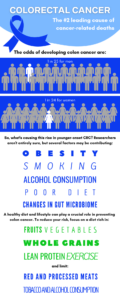The Growing Concern of Colorectal Cancer in Younger Individuals and How Dietitians Can Help
Anne Till MNutr, RDN, LDN
May is National Cancer Research Month, and it’s a time to raise awareness about cancer and the latest developments in cancer research. One area of growing concern in the field of cancer research is the increase in colorectal cancer cases among younger individuals. Colorectal cancer (CRC) is the second leading cause of cancer-related deaths in the United States. While increased screening and prevention efforts have made a difference over the years, recent data from the American Cancer Society reveals a concerning trend: CRC is becoming more common among younger people.
In the past, CRC rates have been decreasing steadily, but the decline has slowed down in recent years. Even more alarming, the number of CRC cases in people under 55 has risen by 9% over the past 25 years. This increase in younger-onset CRC is accompanied by a shift towards left-sided tumors and more advanced stages of the disease.
Researchers aren’t entirely sure what’s causing this rise in younger-onset CRC, but several factors may be contributing. These include obesity, smoking, alcohol consumption, diet, and changes in the gut microbiome. Recent studies have also pointed to high-fructose corn syrup, sugar-sweetened beverages, and processed meats as potential dietary risk factors.

A healthy diet and lifestyle can play a crucial role in preventing colon cancer. To reduce your risk, focus on consuming a well-balanced diet rich in fruits, vegetables, and whole grains, which provide essential vitamins, minerals, and fiber for optimal gut health. Limit your intake of red and processed meats, as they have been linked to an increased risk of colon cancer. Choose lean protein sources like fish, poultry, and plant-based options such as beans and lentils. Stay active by engaging in regular physical activity, aiming for at least 150 minutes of moderate-intensity exercise or 75 minutes of vigorous-intensity exercise per week. Maintaining a healthy body weight and avoiding tobacco and excessive alcohol consumption are also crucial steps in lowering your risk of colon cancer.
Consulting a registered dietitian can greatly benefit those looking to lower their risk of colon cancer. Dietitians are experts in nutrition and can help you create a personalized meal plan tailored to your specific needs, preferences, and lifestyle. They can recommend the right balance of nutrients, educate you on healthier food choices, and provide guidance on portion control, meal planning, and cooking techniques. By working closely with a dietitian, you can gain the knowledge and support needed to make lasting dietary changes that contribute to a lower risk of colon cancer.
Detecting CRC in younger individuals can be challenging. Doctors may not suspect CRC in their younger patients, leading to delays in testing and diagnosis. Additionally, younger patients may not be aware of or follow new screening recommendations.
Despite these challenges, the recent findings from the American Cancer Society emphasize the need for improvement. By raising awareness about CRC in younger people, promoting healthy lifestyles, and encouraging early screening, we can help change the landscape of age-related CRC and save lives.
Remember to consult your healthcare professional for personalized guidance and information about CRC prevention and screening.
Yours in health and wellness,
Anne Till MNutr, RDN, LDN
Illustration by Ashley Henley
Our Dietitians/Nutritionists are here to help you and our office is open. Most major health insurance companies are now covering Telehealth visits, usually at no cost to you. Our office will verify your benefits for you – both for existing patients and new patients. What you choose to eat is an essential part of managing your health and wellness. Let us help you to get on track and find a suitable individualized approach to help you to stay healthy.
Click here to contact us for more information.
Call Us Today: 919-990-1130






